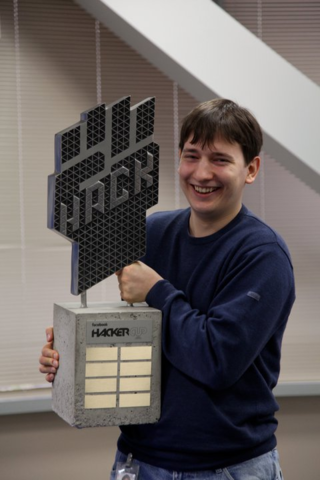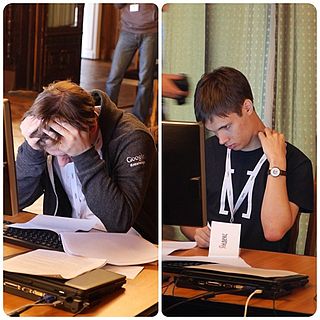
The International Olympiad in Informatics (IOI) is an annual competitive programming competition and one of the International Science Olympiads for secondary school students. The first IOI was held in 1989 in Pravetz, Bulgaria. It is the second largest science olympiad, after the International Mathematical Olympiad, in terms of number of participating countries. Each country sends a team of up to four students, plus one team leader, one deputy leader, and guests.
The United Kingdom Mathematics Trust (UKMT) is a charity founded in 1996 to help with the education of children in mathematics within the UK.
Hong Kong Olympiad in Informatics is an annual programming competition for secondary school students in Hong Kong, emphasizing on problem solving techniques and programming skills. It is co-organized by the Hong Kong Association for Computer Education (HKACE) and the Hong Kong Education Bureau (EDB). It serves as a preliminary contest to international, national and regional competitions such as the China National Olympiad in Informatics (NOI) and the International Olympiad in Informatics (IOI). The first HKOI was held in 1997.
The Canadian Computing Competition (CCC) is an annual programming competition for secondary school students in Canada, organized by the Centre for Education in Mathematics and Computing at the University of Waterloo. Stage 1 is written at high schools and can be written in the programming language of the students' choice, with only a few, such as Maple and Mathematica, disallowed. There are two levels of problems presented, Junior and Senior. The top 20 students in the Senior division are invited to the University of Waterloo to participate in Stage 2, the Canadian Computing Olympiad (CCO). CCO participants are restricted to languages permitted at the IOI, which currently includes only Java, C and C++.. The CCO is used to select students to represent Canada at the IOI.
The United States of America Mathematical Olympiad (USAMO) is a highly selective high school mathematics competition held annually in the United States. Since its debut in 1972, it has served as the final round of the American Mathematics Competitions. In 2010, it split into the USAMO and the United States of America Junior Mathematical Olympiad (USAJMO).

Science Olympiad is an American team competition in which students compete in 23 events pertaining to various fields of science, including earth science, biology, chemistry, physics, and engineering. Over 7,800 middle school and high school teams from 50 U.S. states compete each year. U.S. territories do not compete; however, since 2012 high school teams from Japan have competed at the national tournament as unranked guests.
The Sixth Term Examination Papers in Mathematics, often referred to as STEP, is currently an university admissions test for undergraduate courses with significant mathematical content - most notably for Mathematics at the University of Cambridge. Starting from 2024, STEP will be administered by OCR, replacing CAAT who was responsible for administering STEP in previous years.
The United States of America Computing Olympiad (USACO) is an online computer programming competition, which serves as qualification for the International Olympiad in Informatics (IOI) in the United States of America. Primarily for secondary school students in the United States, the USACO offers four competitions during the academic year. Participants compete in four increasingly difficult divisions, each of which is provided a distinct set of 3 solvable competitive programming problems during each contest. Coding & submitting computer programs can be done in one of four languages: C, C++, Java, and Python. Competitors begin in the Bronze division, and advance through the levels by performing well in their current division.

The Perse School is a public school in Cambridge, England. Founded in 1615 by Stephen Perse, its motto is Qui facit per alium facit per se, taken to mean 'He who does things for others does them for himself'. The School began accepting girls at 11 and 13+ in September 2010 and was fully co-educational by September 2012. 'Perse' is a member of the Headmasters' and Headmistresses' Conference, an association of the leading UK independent schools.
The South African Computing Olympiad (SACO) is an annual computer programming competition for secondary school students in South Africa. The South African team for the International Olympiad in Informatics is selected through it.
The British Mathematical Olympiad (BMO) forms part of the selection process for the UK International Mathematical Olympiad team and for other international maths competitions, including the European Girls' Mathematical Olympiad, the Romanian Master of Mathematics and Sciences, and the Balkan Mathematical Olympiad. It is organised by the British Mathematical Olympiad Subtrust, which is part of the United Kingdom Mathematics Trust. There are two rounds, the BMO1 and the BMO2.
The International Bible Contest is a worldwide competition on the Tanakh for middle school and high school Jewish students. It is held annually in Jerusalem, on Yom Ha'atzmaut. Because the event is officially sponsored by the Israeli government and the Jewish Agency, it is attended by the Prime Minister of Israel, Minister of Education and the Chairman of the Jewish Agency.
The Indian Computing Olympiad is an annual computer programming competition that selects four participants to represent India at the International Olympiad in Informatics. ICO is conducted by the Indian Association for Research in Computing Science. The competition is held in three stages. For the first stage, students may compete in the Zonal Computing Olympiad, or the Zonal Informatics Olympiad. The following two rounds are the Indian National Olympiad in Informatics and the International Olympiad in Informatics Training Camp.
This article describes the selection process, by country, for entrance into the International Mathematical Olympiad.
The Canadian Mathematical Olympiad (CMO) is Canada's top mathematical problem-solving competition. It is run by the Canadian Mathematical Society. The Olympiad plays several roles in Canadian mathematics competitions, most notably being Canada's main team selection process for the International Mathematical Olympiad.

Petr Mitrichev is a Russian competitive programmer who has won multiple major international competitions. His accomplishments include gold and silver (2001) medals in the IOI, gold medals in the ACM ICPC World Finals as part of the team of Moscow State University and winning Google Code Jam (2006), the Topcoder Open, the Topcoder Collegiate Challenge, Facebook Hacker Cup as well as numerous national and online contests. He has achieved the highest rating ever among the Algorithm competitors of Topcoder and consistently ranks in the top two of the world. He is the second highest rated Algorithm coder on Topcoder ratings as of February 2021. He currently works at Google on the search engine and helps to prepare Code Jam.

Competitive programming is a mind sport involving participants trying to program according to provided specifications. The contests are usually held over the Internet or a local network. Contestants are referred to as sport programmers. Competitive programming is recognized and supported by several multinational software and Internet companies, such as Google and Facebook.
The European Girls' Mathematical Olympiad (EGMO) is a mathematical olympiad for girls which started in 2012, and is held in April each year. It was inspired by the China Girls Mathematical Olympiad (CGMO). Although the competition is held in Europe, it is open to female participants from all over the world, and is considered the most prestigious mathematics competition for girls. In recent years, participants from around 55 countries have been invited to the competition.
The United Kingdom Linguistics Olympiad (UKLO) is a linguistics competition for primary and secondary school students in the United Kingdom. The competition is divided into four levels: Breakthrough, Foundation, Intermediate and Advanced, collectively known as 'Round 1', with the top-scoring 5% of entrants at Advanced level eligible for a follow-on round, called 'Round 2' and selection for participation in the International Linguistics Olympiad, one of the international science olympiads. In 2009, teams from two schools competed in a pilot competition, with the winners taking part in the international contest as guests of the All-Ireland Linguistics Olympiad. In 2010, an independent olympiad was created and has taken place every year since.

The National Space Olympiad (NSO) is a science competition conducted in India. The competition is conducted at the Department of Physics, Cochin University of science and Technology. Students from class eight to class ten can participate in the competition. The National Space Olympiad is conducted in remembrance of Indian astronaut Kalpana Chawla.






